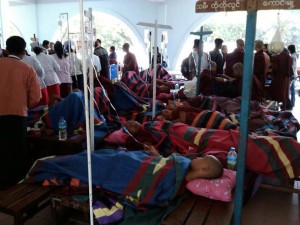Violent Crackdown Against Buddhist Monks, New Regime with an Old Method
By Burma Partnership • December 3, 2012Thein Sein’s government has revealed its true colors with the surprisingly reckless and bloody crackdown on peaceful protesters in Monywa, Sagaing Region. The crackdown on the protest camps came at 3am, without any chance for the protesters to withdraw. It was an ambush and an old tactic that characterizes the old military regime that the world has been trying to believe has reformed.
The Letpadaung copper project near Monywa – the largest copper mine in Burma – is a joint venture between military-owned Union of Myanmar Economic Holdings Ltd., and Wan Bao, a unit of the weapons manufacturer China North Industries Corp. The project has been facing a growing objection since August by the local communities in the Letpadaung area who say the project has confiscated as many as 7,800 acres of land, forcing them out of their villages and ruining the environment.
Riot police aggressively dispersed protesters using water cannons, tear gas and, according to protesters, incendiary devices that set the camps on flames leaving at least 50 people injured by the fire. Many of those who were severely wounded were Buddhist monks.
Many leaders and community members were shocked by the police’s reaction to the protest. Daw Aung San Suu Kyi during her visit to Monywa said the violent crackdown was “absolutely unnecessary” and demanded authorities’ apology. Thaw Zin, one of the protesters in Monywa said, “When the raid started, we didn’t believe that [the police] would use that kind of violence as we are no longer under military dictatorship. We were shocked.”
The violent crackdown has triggered outrage and anger among people. It has led to other solidarity protests in both inside Burma, in neighboring Thailand, as well as Japan and India. Several hundred Buddhist monks launched separate protests in Mandalay, Rangoon, Magwe and Bangkok on 30 November condemning the crackdown and endorsing the calls of the Monywa protesters. These protesters have also become the target of local authorities. Police on 2 December arrested two people who organized the Rangoon demonstrations, following on the heels of a demonstration on 26 November, which saw arrest of 6 protest organizers, all of whom are now locked up in the notorious Insein Prison. Fifty-five civil society and community based organizations from Burma and the region condemned the police’s violence against protesters and called for the suspension of the project, adequate impact assessments and the release of all the protesters who have been arrested so far.
Thein Sein’s office issued a statement on the day of the crackdown in Monywa stating it was according to “democratic practices” and to maintain “rule of law”. The statement was withdrawn in few hours. Now, amid widespread condemnation, Thein Sein has launched an investigation, making Daw Aung San Suu Kyi chair of the 30-member commission. The commission includes 3 National League for Democracy (NLD) MPs, 4 Union Solidarity and Development Party MPs, 2 other political party leaders, 2 members of the 88 Generation Students Group, 8 government officials, 1 Lieutenant Colonel, 2 National Human Rights Commission members, 1 writer, 2 members of the Myanmar Environmental Institute, 1 member of Union of Myanmar Economic Holdings Ltd., 1 member of Myanmar Peace Centre and 2 villagers from Sagaing Region.
The commission’s tasks will include assessment of environmental and social impacts, reasons for objections by the local people, analysis of police crackdown and recommendations on whether the project should be continued. Given that the commission has only 30 days to complete its report, it is clear that this is little more than an attempt to temporarily calm down the angry public. On 30 November, members of the 88 Generation Students Group traveled to Monywa and met with the injured protesters and people from the local community. They have since stated that they will not take part in the commission.
“They all are the same—generals in suits,” said NLD’s prominent leader U Win Tin who questions the genuineness of the ongoing reform process. “The government’s response to the Letpadaung crackdown will be crucial for determining whether military-invested projects still operate above the law in Burma,” said Phil Robertson, Deputy Director of Human Rights Watch’s Asia Division. Indeed, the people’s demand for the closure of the Letpadaung copper project is more than an isolated case. The people are challenging how committed the government is to genuine reform.
Since Thein Sein’s government took office, all the people’s movements, including those in relation to the Myitsone Dam project, ongoing war in Kachin State and the current Letpadaung copper project, are more than opposition to a specific issue. The people are not satisfied with the flawed reform process to date and the superficial freedoms given to them. One should ask President Thein Sein why he immediately suspended the Myitsone Dam project but used such violent means to crack down on the Letpadaung copper mine project. It’s time for Thein Sein and the generals to be serious about reform. Cracking down on peaceful protesters and arresting them has never been a solution and it has proven again this week that it will never be. The government must address the larger issues at stake: unjust laws that continue to restrict freedom of assembly, association and expression, lack of equality of all people in the country, and business contracts signed under the previous military regime that are harmful to local communities.
Tags: Arrest, Burma Partnership, Crackdown, Letpadaung Copper Mine, Mining, Monks, Monywa, President Thein Sein, ProtestThis post is in: Blog
Related PostsBurmese Journalists Call for Govt Protection
Protesters Call for Fair Trial of Myanmar Suspects in Murder of British Tourists
Michaungkan Protestors Stage One-day Hunger Strike
Myanmar: Imprisoned Media Workers’ Sentences Reduced
Arrest of Student on Trumped-up Charges is a Damning Indictment of Justice in Burma










 All posts
All posts